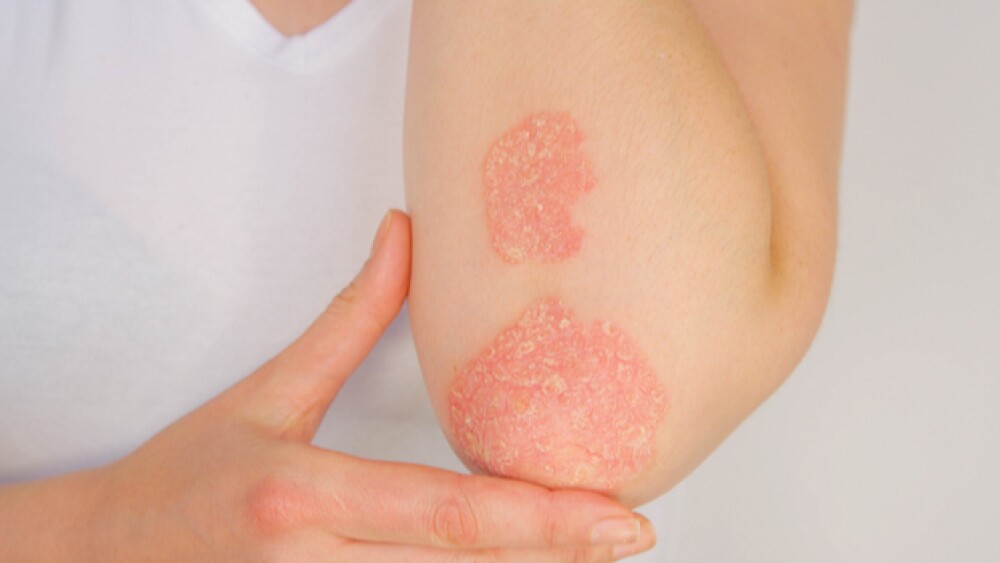Acelyrin, Affibody AB and Inmagene Biopharmaceuticals presented positive Phase II data for izokibep in psoriatic arthritis, while Aurinia’s Lupkynis hit post-hoc treatment targets in lupus nephritis.
A three-way global partnership between Acelyrin, Affibody AB and Inmagene Biopharmaceuticals presented positive Phase II data from a trial assessing izokibep in 135 patients with psoriatic arthritis. The companies said data from the study suggests that the experimental drug demonstrated efficacy over current standard-of-care treatment for psoriatic arthritis.
Data from the Phase II study was presented during a podium session at the 2022 European Alliance of Associations for Rheumatology (EULAR) Congress. Izokibep is an antibody mimetic, interleukin-17A (IL-17A) inhibitor designed to overcome the limitations of monoclonal antibodies. It’s believed that due to its small molecular size, izokibep can reach high drug exposure levels through subcutaneous injection compared to intravenous administration of monoclonal antibodies.
Data from the trial of 135 patients showed positive efficacy across multiple endpoints. The study assessed various endpoints at 16 weeks including the American College of Rheumatology (ACR) response, the Leeds Enthesitis Index (LEI) and the Psoriasis Area and Severity Index (PASI) score. Additionally, the study examined the quality of life impacts.
Frank Behrens, head of rheumatology clinical research at the Fraunhofer Institute for Translational Medicine and Pharmacology ITMP at Goethe University in Germany noted that psoriatic arthritis is painful and debilitating. Behrens added that residual entheseal pain and inflammation, which occurs in up to 60% of PsA patients, is associated with more severe disease, as well as a poorer quality of life. Data presented at EULAR shows a potential opportunity for “increased therapeutic efficacy in joints, entheseal pain and inflammation resolution and improved quality of life” with izokibep, he said.
“The improvements demonstrated in arthritis, psoriasis and enthesitis are exciting relative to responses reported for the current standard of care,” Professor Peter Taylor, chair of musculoskeletal sciences at the University of Oxford said in a statement. “Combined with the clinically meaningful improvement in disease-specific quality of life and well-tolerated safety profile, izokibep seems promising for patients living with the painful and debilitating symptoms of psoriatic arthritis, and I am eager to see its continued development for patients.”
Izokibep was well-tolerated in the study and demonstrated a favorable safety profile.
The three companies backing research into izokibep each hold commercialization rights in various parts of the world. Affibody holds rights in the Nordic countries, while Inmagene maintains rights in parts of Asia, including China, Hong Kong, South Korea and Taiwan. Aceleryn holds rights for the other global markets, including the United States and Europe.
Aurinia Lupus Drug Hits Treatment Targets in Post-Hoc Study
Also at EULAR, Canada-based Aurinia Pharmaceuticals shared data demonstrating the efficacy of Lupkynis (voclosporin) for the treatment of people with lupus nephritis. Lupkynis, greenlit by the U.S. Food and Drug Administration last year, is the first approved oral therapy for lupus nephritis, a condition that causes irreversible kidney damage and increases the risk of kidney failure, cardiac events, as well as death.
Aurinia presented post-hoc data that showed Lupkynis treatment achieved the proteinuria treatment targets recommended by the European Alliance of Associations for Rheumatology and the European Renal Association. The post hoc analysis was comprised of pooled data from the Phase II AURA-LV and Phase III AURORA 1 studies. The data showed that treatment with Lupkynis, alongside mycophenolate mofetil and low-dose steroids reduced urine protein creatinine ratio in patients. Data showed that after three months, 78.4% of patients treated with Lupkynis saw a greater than 25% reduction in UPCR. That was in comparison to 62.4% in the control group. The gap increased at six months, with 66% of Lupkynis patients seeing a greater than 50% reduction in UPCR, while only 47% of the control group saw such a reduction.
“We are thrilled to see Lupkynis has met the European Alliance of Associations for Rheumatology and the European Renal Association’s guidelines indicated for UPCR treatment targets,” Neil Solomons, chief medical officer at Aurinia said in a statement. “We’ve already demonstrated the many benefits of treatment with LUPKYNIS for patients with lupus nephritis through our studies at Aurinia, and analyses such as this one builds additional evidence and confidence for rheumatologists and nephrologists to offer patients this important treatment option.”





